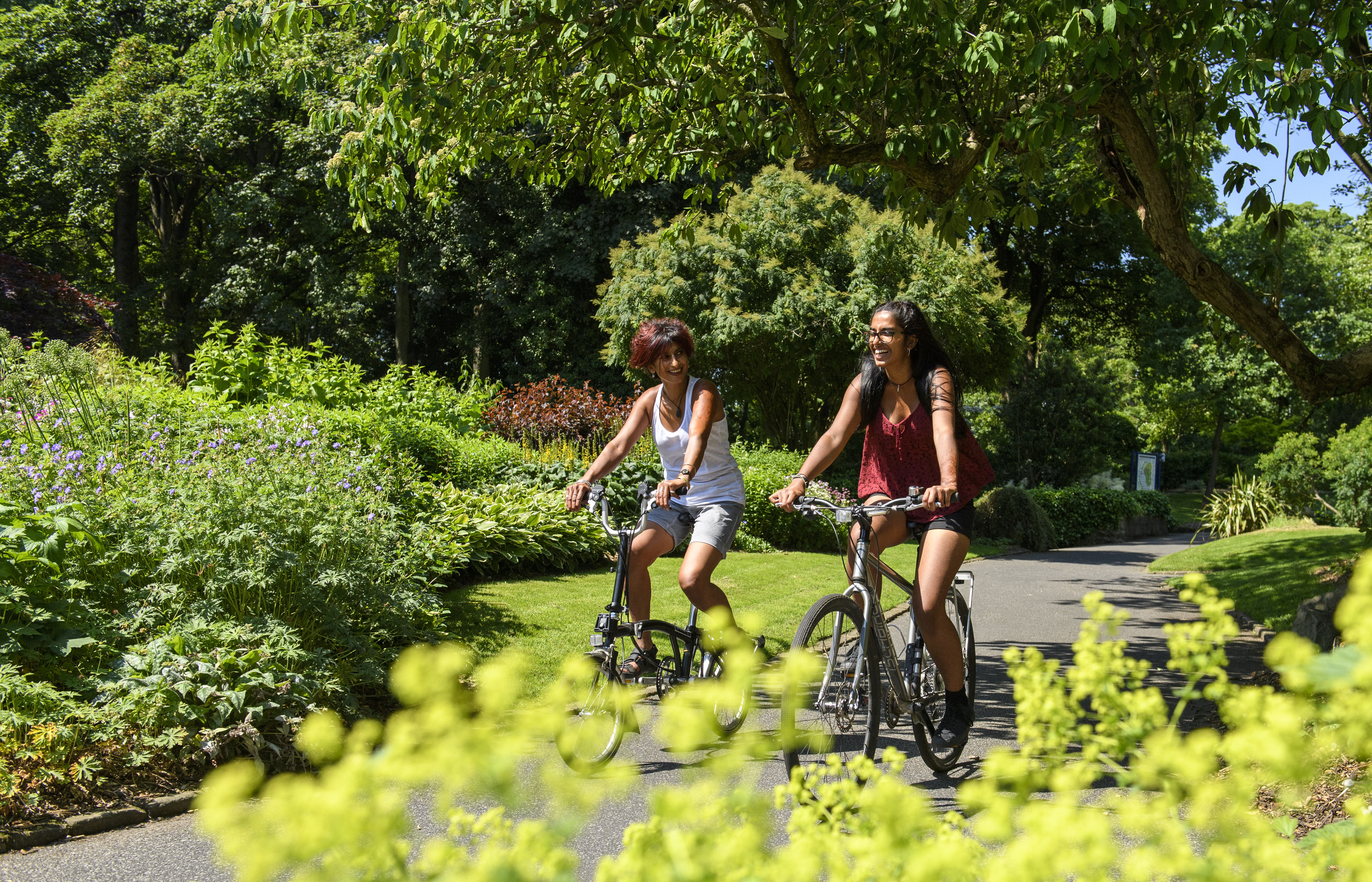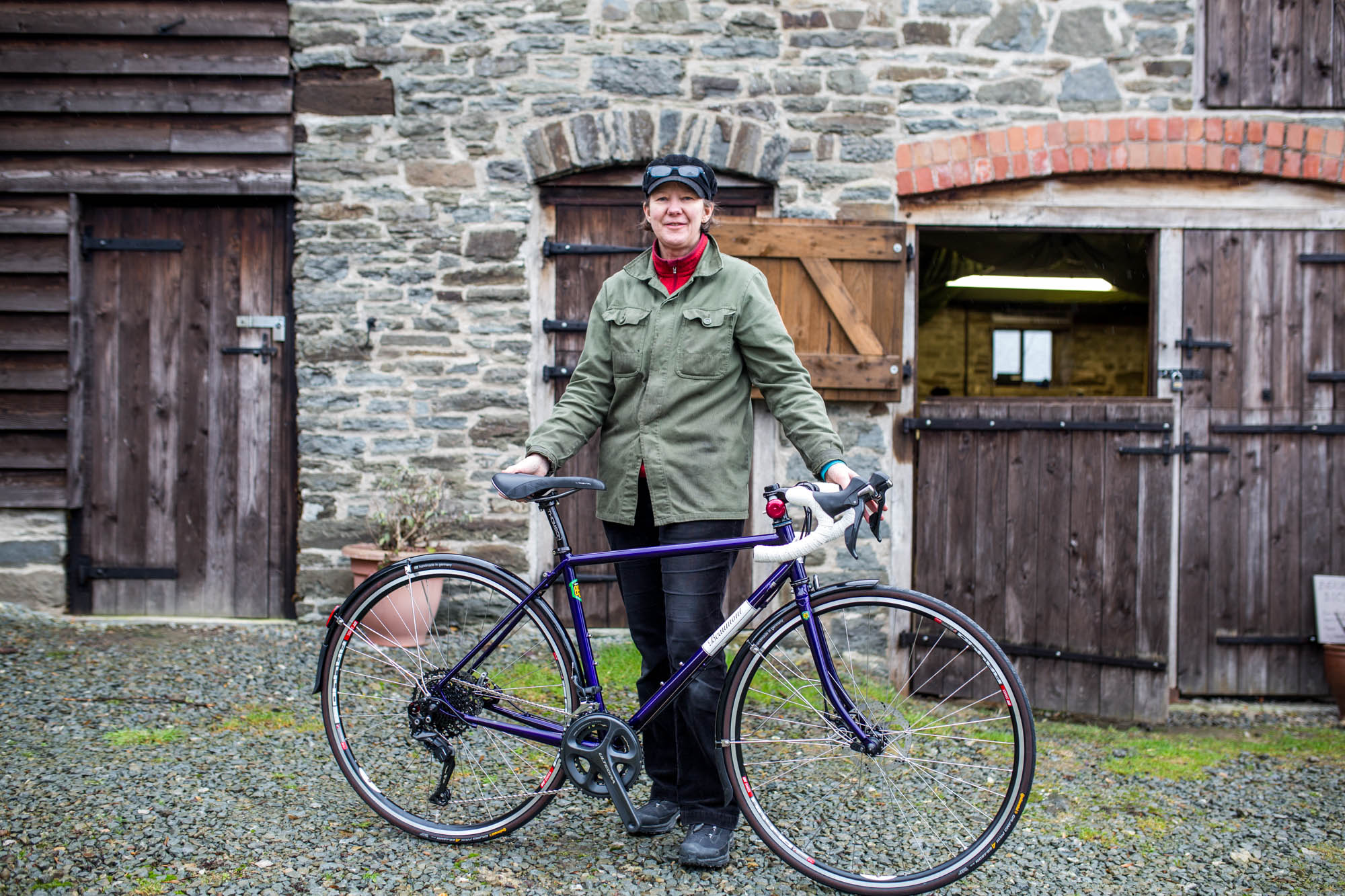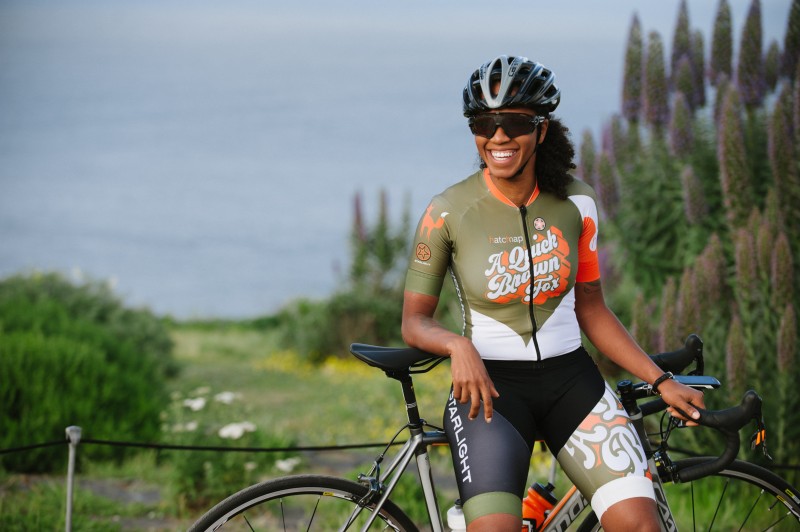Cycling though the menopause

From enduro mountain bikers to cycling commuters, competitive racers to those who pootle round the park, women cycle for fitness, fun, practicality and adventure. But what happens if menopausal symptoms start to disrupt your enjoyment of cycling or hinder your performance? Conversely, can cycling actually help combat those symptoms?
Menopause impacts each woman differently: some barely notice it, while others are floored by it. However, around 70% of women will have symptoms that can last for several years; these might include joint pain, hot flushes, low mood and anxiety and weight gain.
Some find cycling to be a highly effective way of coping with these symptoms, others find themselves so overwhelmed that it impacts on their ability to ride.
Caroline, aged 49, is a keen mountain biker whose symptoms means she has difficulty sleeping.
“I wake up in the early hours then lie awake for what seems like hours feeling anxious about things that I would normally take in my stride.
“The knock-on effect is that the next morning I have no energy and feel tired all the time. This impacts my whole life, but I especially notice it when I go out on my bike: I just don’t have the energy or drive that I did before.”
Meanwhile, road cyclist Abbie, aged 54, turns to cycling to help alleviate her symptoms. “I have hot flushes and moments of feeling a bit panicky which can occur at any time, but neither ever happen while I am riding my bike. I don’t know why this is, but cycling certainly gives me a little welcome respite!”
How exercise can help menopausal symptoms
How do the menopause and cycling impact each other? We asked Dr Juliet McGrattan author of Sorted: The Active Woman’s Guide to Health, and Dr Renee Hoenerkamp, medical writer and women’s health expert, for advice.
“Every woman is affected differently, but exercise can help with the majority of menopausal symptoms,” said Dr McGrattan. “The feel-good chemicals, (the best known being endorphins) that the body releases when you exercise can help to counteract the symptoms of low mood, anxiety and ‘brain fog’ that women commonly struggle with during the menopause.
“Exercise can also help improve sleep, which can be disrupted, either directly or indirectly as a result of night sweats. There’s emerging evidence that exercise will reduce the frequency and intensity of hot flushes, with one study in particular showing this effect in women who increased their fitness levels.”
Dr Hoenerkamp said: “Joint pain is common in menopause and using exercise to strengthen the muscles around your knees, hips and spine can help support them and ease discomfort.
“We also know that bone density decreases after menopause and exercise can help counteract that loss and maintain a healthy bone density to protect against fractures in the future. Keeping our core strong and focusing on exercise that strengthens the pelvic floor can really make a difference to menopause related issues such as vaginal prolapse and urinary incontinence.”
Cycling is ideal for its cardiovascular and mood-enhancing benefits, but the menopause is a time to reap the benefits of other forms of exercise too, as well as thinking about what really works for you.
“If you’re feeling anxious and in need of calming, then it might be a yoga class that works for you, but it might also be a high-intensity workout on the turbo trainer where you can release your frustrations,” says Juliet.
“Weight gain is often an unwanted and stubborn side effect of the menopause. Your metabolism generally slows down around this time, partly due to a decreasing muscle mass, and weight can gradually increase as a result. Strength exercises will help you to build and maintain muscle mass, giving a boost to your metabolism and helping you to control your weight.
“Strength exercises and weight-bearing exercises will also help to maintain bone mass and avoid osteoporosis.
“So mixing it up is the best idea and stepping up a gear from your previous exercise levels will be beneficial.”
But what if your menopausal symptoms are affecting your enjoyment of cycling?
Juliet offers the following advice: “It can be a bit of a roller-coaster journey during the menopause, with a huge variation in how you feel day to day or week to week, so don’t panic. Look at the bigger picture and see if there are other things in your lifestyle that might be bringing your performance or enjoyment down, sometimes it’s stress at work or eating badly that are the causes.
“Ease up the pressure a bit and enlist the help of friends, often a social ride will bring back the fun. It’s vital to keep active, so don’t be afraid to share your concerns with your doctor; menopause symptoms that affect your hobby are just as important as those that affect your work.
“Remember that there are health issues that are more common around the menopause that can affect your performance and mood, too. For example, an underactive thyroid or anaemia due to heavy periods could certainly make you fatigued and slower than usual.”
Menopause is an opportunity to revamp everything in your life from diet, relaxation, your time and exercise
Dr Renee Hoenerkamp, medical writer and women’s health expert
Diet plays an important role when it comes to easing symptoms
Renee explains that diet is vital: “Overall, a Mediterranean-style diet that is high in healthy fat, fruit, protein, vegetables, whole grains and phytoestrogen rich foods, not only provide a basis for heart, bones and colon health, but may also help hot flushes and muscle mass loss.
“Milk, yoghurt and cheese contain calcium, phosphorus, potassium, magnesium and vitamins D and K – all of which are crucial for bone health. Dairy may also help sleep. This is thought to be due to the amino acid glycine, which is found in milk and cheese. Some evidence even links dairy consumption to a decreased risk of premature menopause, possibly due to high levels of oestrogen.
“Some studies demonstrate omega-3 supplements decreasing the frequency of hot flashes and the severity of night sweats. The jury is out, however, as there are other studies which show no benefit. However, we know omega 3s are good for heart health, so there is nothing to lose in this diet adaptation and much to gain. So choose fatty fish, such as mackerel, salmon and anchovies, and seeds like flax and chia.”
“Phytoestrogens are found in foods and act as oestrogens in the body. Whether they can supply enough oestrogens is always controversial, but some recent research suggests they may benefit women in menopause. Phytoestrogen-containing foods include soybeans, chickpeas, peanuts, flax, barley, grapes and berries, as well as green and black tea.
“Many women swear by natural phytoestrogens to help reduce the symptoms of menopause and some studies have shown increases in levels of oestrogen in women eating large amounts. The jury is, however, still out.”
“Women lose muscle mass and bone strength after menopause. Eating a diet high in protein can help slow or stop this decline alongside exercise. High-protein foods include eggs, legumes, meat, fish and dairy products.
“Finally, cutting down on caffeine, alcohol, processed food, carbohydrates and sugars will help avoid weight gain, reduce blood sugar and the risk of diabetes and even hot flushes, as caffeine and alcohol are known flush triggers. Both alcohol and caffeine contribute to poor sleep.
“Salt has been linked to high blood pressure so skipping it will help your heart stay healthy. It is also linked to increased bone-density loss and low mood, so there are plenty of reasons to cut back.”
Can HRT help?
Many women turn to HRT, while others avoid it due to concerns about possible health risks. So what is the latest medical opinion?
Juliet advises talking to your GP: “HRT is certainly a very effective way to treat symptoms and for many women it is life changing. It quickly restores falling oestrogen levels and you can expect to notice a difference within four weeks, although it may take a few months to reach the maximum benefit.
“You should, however, always discuss your individual circumstances with your doctor to take into account your personal medical history.”
“It is a very personal choice and for some women is not advised. However, most women can take HRT and it is the best solution for all symptom relief, bone-density protection and heart and brain health long term,” agrees Renee.
“Women only get their heart disease after menopause and if started within 10 years of menopause then HRT protects against it. There is also emerging evidence that HRT protects against dementia.
“We now know that under the age of 60 the benefits of HRT outweigh the risks, which are in fact very small and, depending on the form in which you take the HRT, can actually be negated totally. So it’s safe for almost all women.”
Juliet and Renee also agree that its best to look at menopause as an opportunity to reassess your lifestyle. Continuing to ride your bicycle – or taking up cycling – can be a really important part of that process and highly beneficial.
As Renee says: “Menopause is an opportunity not a curse; it’s an opportunity to revamp everything in your life from diet, relaxation, your time and exercise.”






